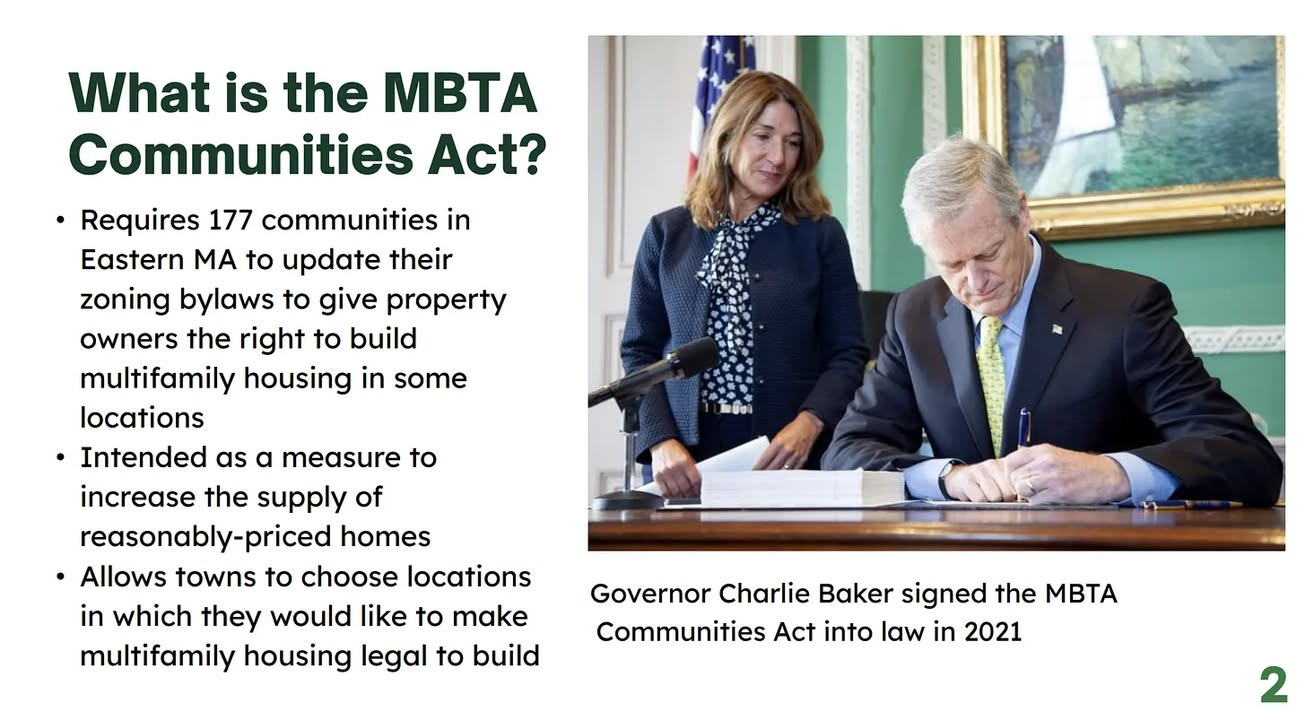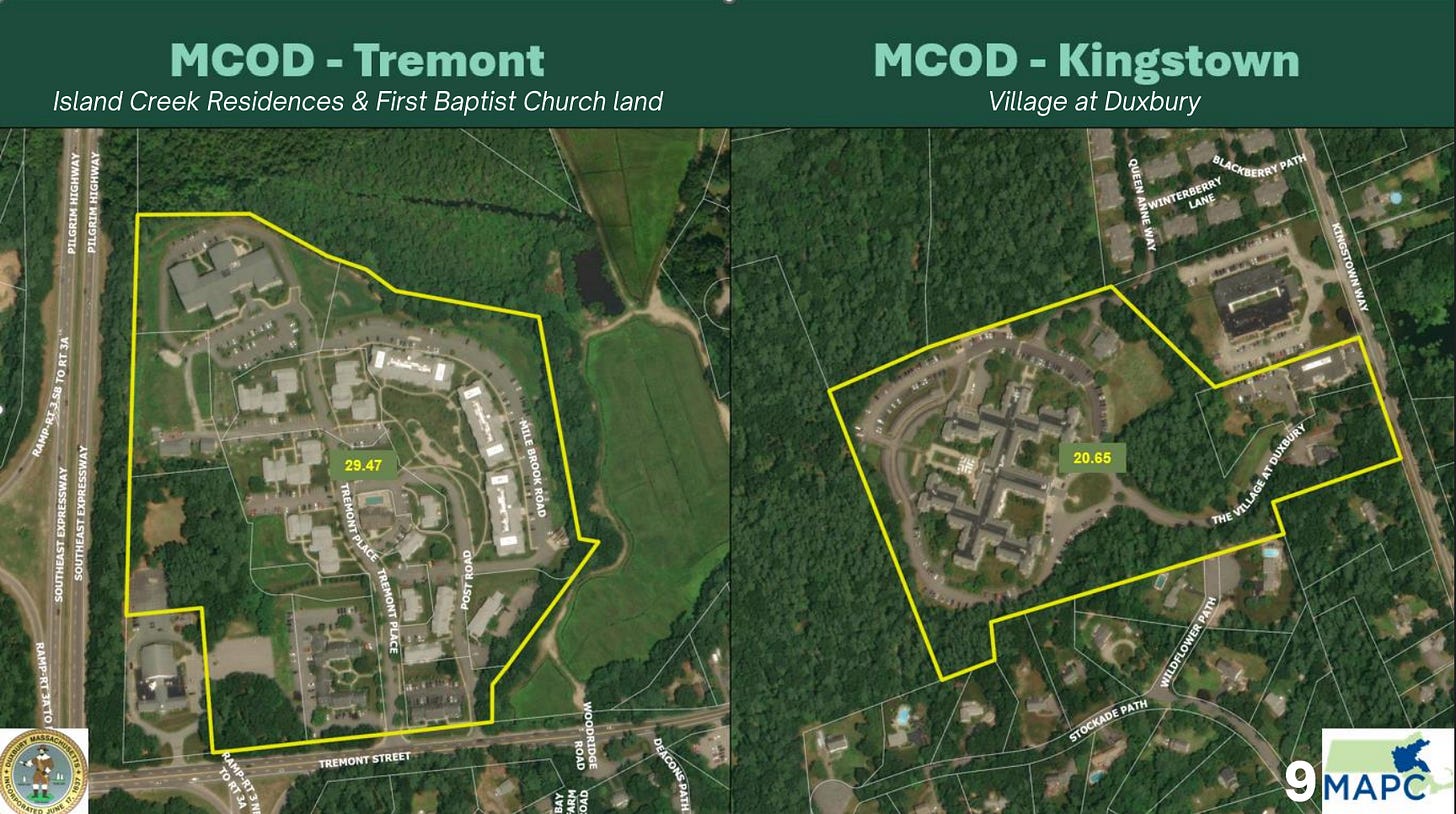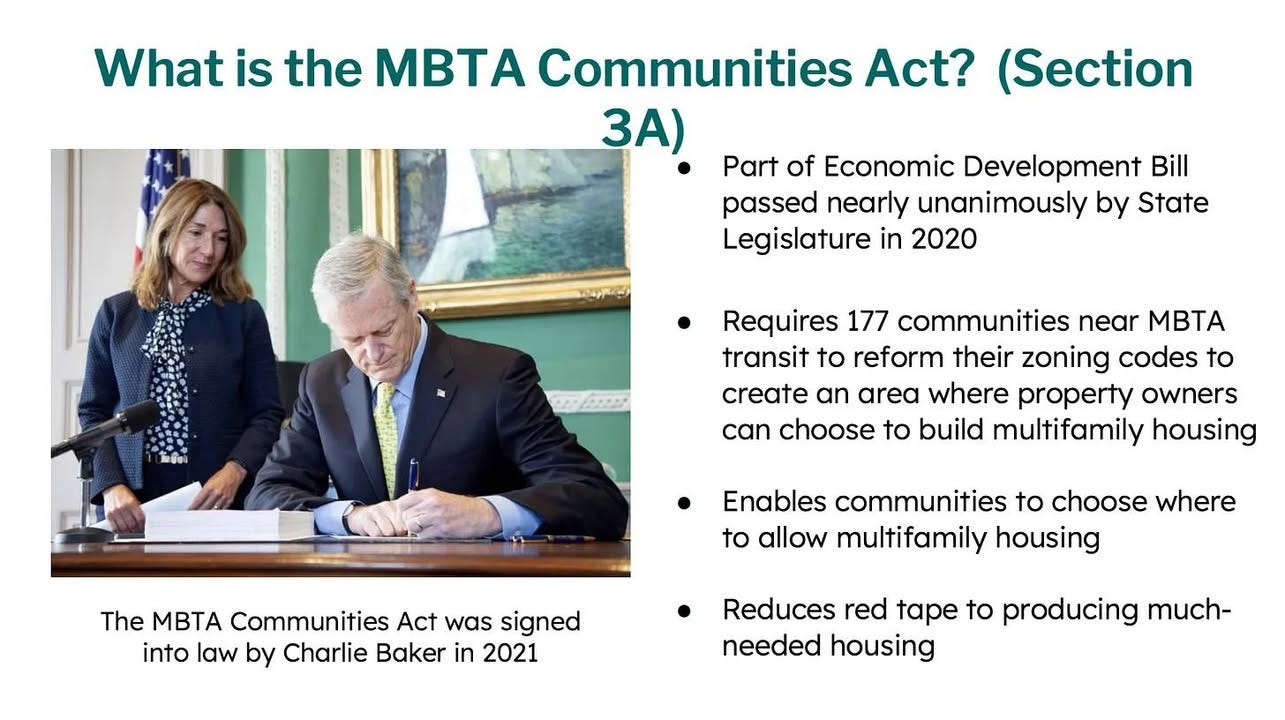"Nobody Put These Words into Our Mouth"
A presentation by a Duxbury MBTA Communities Working Group member demonstrates how the state gets town committee members to parrot talking points supporting Healey administration policies.
May 7, 2025 (Duxbury) — “This is the Duxbury Working Group's words. Nobody put these words into our mouth,” claimed Megan Driscoll, a member of Duxbury’s MBTA Communities Working Group at a May 7 presentation to the Duxbury School Committee.
An analysis of Driscoll’s presentation, however, shows that most of the main points in the presentation bear a remarkable similarity to material developed elsewhere, most notably a March 26, 2024 seminar put together by Massachusetts Housing Partnership (MHP). These talking points have been used over and over again in towns across Massachusetts and have successfully convinced many towns to approve new MBTA zoning. .
Driscoll insisted to the School Committee, however, that any outside help was merely superficial.
“We got help from CHAPA, which is like a PR firm,” said Driscoll. “They helped us put together the presentation. They made our presentation pretty. The words on the paper are our words, so don't listen to misinformation.”
Those concerned about this misinformation may want to look at the April 29, 2025 story “Megan Driscoll and a Developer-Friendly NGO Scripting Words for the Selectboard Chair to Recite at MBTA Zoning Forum” and in which Driscoll says, “CHAPA gave us this language.”
CHAPA is a developer- and bank-funded nonprofit that lobbies to pass affordable housing policies like MBTA Communities zoning. Duxbury received a grant from MHP to pay for CHAPA’s consulting services.
Working Group Chair Steve Gandt is a senior loan officer at MHP, a quasi-state public agency that has been helping the Executive Office of Housing and Livable Communities implement MBTA Communities zoning at a local level. MHP also provides loans to developers.

The following presents six message points that are similar to the information presented at the MHP seminar. There are so many other similarities to other information circulated by developer-friendly groups and the state, but here’s a start.
It’s Only Zoning
Ian Burns, community and economic development program manager, Merrimack Valley Planning Commission:
Let's hop right in, leading with zoning and not development. Many of you know this by now; it's been a long conversation, but this is a zoning change. We are not counting units that we already have, nor are we counting construction units. We only need to figure out the zoning that exists. So, we need to emphasize that upfront and throughout every presentation and communication with the public. I think it's very easy—I often trip up on the development or future development or that sort of thing—but let's keep in mind that we're talking about any development that is really theoretical. All we're doing is changing the zoning.
Driscoll:
By passing the zoning plan, Duxbury is not required to build or pay for any housing. The town only needs to make it legal for property owners in the proposed districts to build multifamily housing if they choose to do so.
No One’s Actually Going to Build Anything
Burns:
Detail those kinds of checks along the process so residents understand that just because your requirement, let's say, is 750 units, that doesn't mean you're permitting a 750-unit development today. You're only creating the zoning. We’ve found it helpful to show folks, “Here's what happens in the process if a development were to come forward,” tackling that unit capacity confusion.
This is a really complicated piece, and it gets tricky because we're just talking about theoretical units and theoretical unit capacity with all of this. The common quotes we hear are, “We have to allow 750 units,” let's say that's your number, and people freak out, thinking you're permitting 750 units right now. Then we often show the parcels that are being considered, and the comment is, “I don't see how you can fit 100 units on that parcel or 200 units—that doesn't make any sense; that's insane.” So, I think one of the things we need to do, no matter what level of detail you give, is make clear the theoretical nature of the compliance model and its limitations.
Driscoll:

This approach to zoning already existing dense areas, such as the expanded development rights, would create very little opportunity to add new units. If new units were to be added, it would only be at the Island Creek area. Adding new units to properties with existing apartment buildings is logistically difficult and expensive. They could, for example, build upward, taking some of the units that are only four stories and some that are three stories, so the three-story buildings could go to four stories. But again, this is all very unlikely.
Gandt at an April 28 Planning Board meeting:
It creates very few legal opportunities for property owners to add new units. At the Village at Duxbury, there’s really no opportunity at all and the opportunity is minimized at the Island Creek subdistrict. Adding additional units to properties that have existing development on them is logistically difficult, and it’s prohibitively expensive as opposed to working on a greenfield area.
Here, as discussed in a previous article, the working group removed reference to the number of new housing units that could be built at each site so as to avoid dealing with people “freaking out” as Burns described.
Tearing down an existing development is relatively inexpensive.
Here’s What We Heard From the Community
Lee Hartman, director of planning and development, Town of Plymouth:
I think that outreach was very important. When we came back to the community, we were saying, “This is what we heard from the community; this is what the community has told us.” I think that's a powerful way to explain this so that we're not telling the community what, as professionals, we think is better. We're responding to what we heard from the community.
Driscoll:
The message we received was basically that residents don't want to rezone any properties in town where multifamily housing can be built in the immediate future. That was the gist of what the Select Board, the Planning Department, and the MBTA Communities group heard.
Notice that Driscoll is trying to say that Duxbury’s main concern about the MBTA Communities zoning is that residents objected to the rezoning at Bongi’s, not to the idea of state-mandated zoning itself.
Local Choice of Location
Burns:
We hear "local control, local control" all the time. I think we need to focus on the fact that you do have a good amount of local control with this law. The state has set its parameters, but you have a lot of latitude in deciding where and how this fits. There are likely hundreds of options in all these communities.
Driscoll:
It does allow towns to choose the locations where they would like this multifamily zoning to go. Although it is a mandate that we have to find the space for zoning, we do get to choose currently.
Threats of a Special Master
Burns:
Driscoll:
If we don't choose the zoning locations, the state could choose them for us. If the state chooses them, they are not going to select the option we've chosen, which is basically that no building can be done. Instead, they're going to choose a greenfield, and they're going to develop housing on it. So, we want to control that.
That last statement from Driscoll is the type of misinformation that she warned about at the top of the piece. Here’s an excerpt from a February 4, 2025 Duxbury Substack article in which Town Counsel Amy Kwesell of KP Law describes what would actually happen if Duxbury did not pass zoning changes.
If Duxbury does not approve the new zoning plan, Kwesell does not expect a special master to come in and re-zone the town. Instead, she expected the attorney general to try to enforce the law by filing an action in court. The court would then give the town a certain amount of time to enforce the law, and if the town does not comply, then the town would be in contempt of court.
When the attorney general first filed against Milton, she said, “They did ask for a special master… but that was abandoned during the briefing process. In my opinion, that would be a violation of 40A Section 5, which requires that Town Meeting be the legislative body that enacts zoning.”
The Threat of Loss of Grants
Burns:
Driscoll:
Benefits of complying with the MBTA Communities Law: First and foremost, Duxbury is going to retain its eligibility for 17 state grant funding programs.
There’s some question about whether the $2 million figure is exaggerated because it includes money for the seawall, a one-time project.
In any case, the decision on the preliminary injunction in Duxbury’s unfunded mandate lawsuit is due on June 9. Even if the decision was late, grant funding would only be in abeyance for a few weeks while the judge reached his decision. In the meantime, the town can always resort to the same shaming techniques that forced the governor to fund the town’s fire safety grants.
In response to an email that Duxbury Substack sent to Driscoll about whether her presentation to the School Committee was misleading, Gandt provided the following information.
I spoke with Megan Driscoll this afternoon. I understand you intend to portray the MBTA Communities Working Group's presentation as entirely either Megan's or CHAPA's work product.
I want to be as clear as I possibly can with you. The presentation that Megan shared with the Duxbury School Committee this week was not just Megan's work product. It is the work product of the entire Duxbury MBTA Communities Working Group. The Citizens Housing & Planning Association (CHAPA) provided the Working Group with a template the Working Group substantially reworked into the presentation you saw at the School Committee meeting this week. The presentation consists solely of the context and information that the Working Group as a whole believes best communicate the proposition on which Duxbury residents will be voting at Special Town Meeting on June 16. To portray the presentation otherwise would simply mislead.
Readers are left to judge for themselves. More similarities will be provided in a future post.















